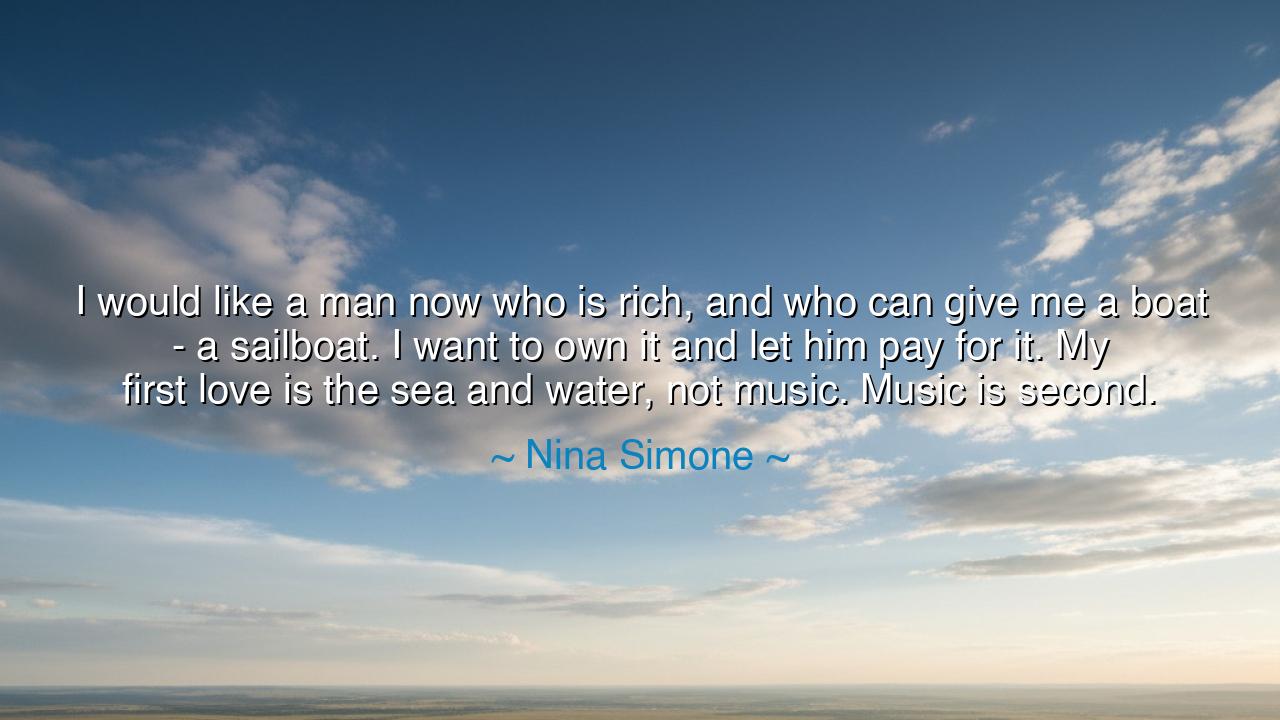
I would like a man now who is rich, and who can give me a boat -
I would like a man now who is rich, and who can give me a boat - a sailboat. I want to own it and let him pay for it. My first love is the sea and water, not music. Music is second.






“I would like a man now who is rich, and who can give me a boat—a sailboat. I want to own it and let him pay for it. My first love is the sea and water, not music. Music is second.” Thus spoke Nina Simone, priestess of sound, bearer of sorrow and fire, revealing not only her longing but her truth. In this confession we see a woman weary from the burden of genius, who turns her eyes to the sea—a place of freedom, silence, and eternal renewal. For while the world crowned her as an icon of music, she herself proclaimed that her heart first belonged to the waters, to the horizon where wind and wave wash away the chains of expectation.
The origin of this declaration is rooted in Simone’s own life of struggle. Though gifted with unmatched talent, she carried the heavy weight of racism, injustice, and personal turmoil. Music, though her craft and her legacy, was also her battlefield. It was the place where she fought for dignity, where she voiced the pain of her people, where she bore the fury of a world that often rejected her. In such a life, the sea offered another kind of love—one untainted by human cruelty, one unmeasured by applause, one that asked nothing of her but presence.
History has always remembered the sea as a sanctuary for those who carried heavy burdens. The poet Lord Byron declared, “There is a pleasure in the pathless woods… but the ocean is my delight.” He, too, sought in the waves the solace that society could not give. For the sea is older than music, older than kings, older than all the noise of men—it is eternity itself, whispering freedom to the weary. Nina Simone, like Byron, recognized in it the purity that no stage, no record, no crowd could provide.
Yet her words also contain a paradox. She says, “Music is second.” To the world, this seems strange, for her name is inseparable from song. But here lies the deeper wisdom: even the greatest talents, even the most sacred callings, are not always a person’s first love. Behind the stage, behind the legend, lives the human soul, which longs not only to give but also to rest. Simone reminds us that even those who change the world need their own refuge, their own first love, where they can be simply themselves.
Consider also the tale of Ernest Hemingway, who, though a writer of fire and force, confessed that his truest joy was fishing upon the sea. He, too, created works that shook the world, yet he found his peace not in the pen but in the waters. His life, like Simone’s, shows us that the deepest loves of the soul are often different from the works by which history remembers us. The calling and the refuge may be separate, yet both are essential to the wholeness of the human spirit.
The lesson for us is profound: honor not only the gifts the world demands of you, but also the secret loves of your heart. Do not let the weight of duty or talent smother the quiet places where your soul finds renewal. For your music—whatever form it takes in your life—may be your offering to the world, but your sea—whatever gives you rest and joy—must be your sanctuary. Without both, the spirit falters.
Therefore, let each person act with wisdom. Give yourself fully to your calling, yes, but also protect the loves that restore you. If the world crowns you for your labor, rejoice, but do not abandon the horizon, the mountain, the garden, or the silence that first gave you peace. For greatness is not only in what you give to others, but in how you nourish the quiet flame within.
So let Nina Simone’s words endure: “My first love is the sea and water, not music. Music is second.” Take them as a reminder that even the greatest offerings to the world cannot replace the personal sanctuaries of the heart. Find your sea, and protect it. For it is there that your spirit is cleansed, your strength renewed, and your soul made whole again.






AAdministratorAdministrator
Welcome, honored guests. Please leave a comment, we will respond soon